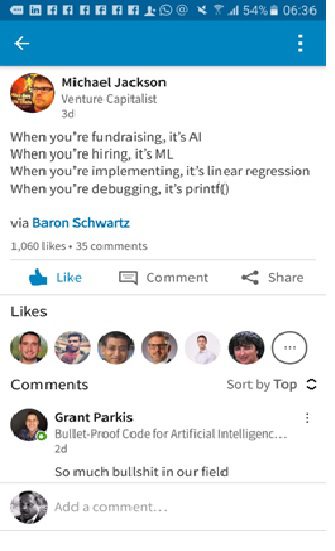
I like this image from the twitter feed of the Paris based Venture Capitalist Michael Jackson
It shows that everyone wants to be an ‘AI start-up’ – but only when it suits them!
So, how exactly do you build (and identify) an AI start-up
I always like to start off with a set of ground definitions:
Machine Learning – is learning rules from data
Deep Learning – is automatic feature detection (representation learning) using neural networks
Artificial Intelligence – is machines that can act in an autonomous manner – mostly based on deep learning architectures
Of course, we currently have narrow AI (and not General AI)
So, in that context – on one hand- we could rightly say that a spectrum of algorithms is applied to a problem – i.e. machine learning will help you to get the low hanging fruit. So, the use of a specific strategy or algorithm need not define an AI start-up
So, here is my list of five criteria for identifying an AI start-up
1) Your service must improve with experience – this is a basic criteria without which you really do not have any machine learning or deep learning. Ie user no 2 should benefit from the experience of user no 1 and so on. So, a new competitor who starts a company cannot provide a better service than you. Try starting a company selling books on the web and try to compete with Amazon’s recommendation engine – you won’t get very far
2) The model is the IP (model = data + algorithm)
The ‘model’ is the data plus the algorithm. The model is the primary IP of your company. So, you need to have processes around it to keep the model refreshed and tuned. There are many ways to do this – including MLOps – Machine Learning and Devops . Whatever your approach – the nurturre and maintenance of the model must be on your radar
3) You should either own a body of data OR own the enriched body of data even if someone else owns the data – Your data strategy must be built on enriching a body of data – even if you do not own that body of data. The best example of this is Google. Google does not own the link to specific websites (because the person who created the link could take away the link) – but Google owns the metadata behind the data through the PageRank algorithm.
4) Choose a hard problem but not Netflix challenge: By definition you need to choose a hard problem – else the more complex algorithms like deep learning are too expense. But you must be careful not to choose a problem that cannot be practically solved. The best example of this is the Netflix challenge. The winning algorithm was great – but only in theory – i.e. was not pragmatic to implement ( Why Netflix never implemented algorithm that won Netflix 1 millionshtml)
We evaluated some of the new methods offline but the additional accuracy gains that we measured did not seem to justify the engineering effort needed to bring them into a production environment.
5) Improve the business state of the art: Your start-up idea must improve the current business state of the art. For example – fraud detection is a problem with a fairly mature history. So, your deep learning solution should improve the current state of the art to create a viable business
Trust this was useful. Welcome any other guidelines for identifying an AI startup
